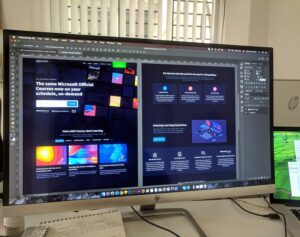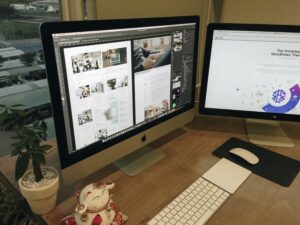There’s a famous quote by Hans Hoffman: “Design is the intermediary between information and understanding.” This resonates deeply in the world of web design, where the relationship between a client and a designer hinges on clear communication, alignment of goals, and a shared vision. Great design is subjective—what one client loves, another might hate. But beyond personal preferences, a successful partnership with a web design company depends on asking the right questions from the very beginning.
Selecting a development partner who understands both the technical aspects and shares your vision for the project is crucial for a successful website.
Whether you’re launching a new website or revamping an existing one, clarity in expectations and understanding the design process is essential. Below, we’ve expanded on 17 essential questions and added six more that will help you vet a potential web design partner thoroughly. Use these 17 questions as your guide to ensure your project runs smoothly and delivers the desired outcome.

1. How Does Your Creative Process Work?
Understanding a web design company’s development process will give you valuable insight into how they handle projects from start to finish. Ideally, this question should have already been asked during the interview stage, but it remains critical to fully comprehend their structured approach before any work begins. A transparent, well-defined process builds trust and eliminates surprises down the road.
Here’s what you should look for in their answer:
- Project planning: How do they scope the project, and what steps are involved in kicking off the work?
- Prioritization: How do they balance competing priorities to ensure your project gets the attention it deserves?
- Drafting designs: What’s their workflow from conceptual drafts to finalized designs?
- Timeline management: How do they ensure timelines are maintained?
- Communication: How frequently will you receive updates?
- Client goals: How do they keep your objectives top of mind throughout the process?
- Delivery and revisions: What’s the process for final delivery and handling post-launch tweaks?
A clear understanding of the design company’s methodology will help you feel confident as the project progresses.
2. What Are My Goals, and How Will You Help Me Achieve Them?
Every website should serve a purpose, whether it’s increasing sales, generating leads, or building brand awareness. If the design company doesn’t fully grasp your goals, the end product might miss the mark.
Start by articulating your objectives clearly. Then ask the company how they plan to achieve them. Will they offer:
- Strategic planning to ensure design aligns with your business goals?
- User experience (UX) research to understand your audience?
- Conversion rate optimization (CRO) to enhance engagement and results?
- Web development services to build a robust and functional site that meets your needs?
Ask for a game plan or roadmap that demonstrates they’ve thought through how to transform your vision into a reality.
3. Can You Share Examples of Past Projects and Client Success Stories?
One of the best ways to assess the capability of a web design company is by reviewing its portfolio. Don’t just look for aesthetics—dig deeper into the success of the sites the team has built.

Ask about:
- Conversion success: Did a redesign result in measurable improvements, such as increased sales or reduced bounce rates?
- User feedback: How did the target audience respond to the new site?
- Long-term partnership: Do they have repeat clients? This can be a good indicator of satisfaction.
- Existing site: Did they review the current website’s performance and features to identify potential improvements before deciding to revamp or create a new one?
A company’s past projects can give you a clear sense of their expertise and design sensibility, and help you decide if they’re the right fit for your needs.
4. What Happens if a Client Doesn’t Like the Design?
No matter how experienced a web design team is, there may be occasions when a client isn’t thrilled with the initial designs. It’s important to know how they handle these situations before they arise. Ask questions like:
- Why did the project miss the mark? Is it usually due to unclear goals or miscommunication?
- How do you course-correct? How quickly do they iterate based on feedback?
- What’s the process for revisions? Will they charge extra for significant changes or revisions?
Knowing how the company handles bumps in the road will help you feel more at ease about potential hiccups along the way.
5. How Will Our Timelines Work Together?
Timing can make or break a project. Establishing a clear project timeline is essential. Be upfront about your deadlines and ask the design company about their timeline. This ensures that both parties have a clear understanding of the project’s scope and expected milestones.
When discussing timelines, you should clarify:
- How long the project will take, start to finish.
- Key milestones for review: Make sure you’ll have opportunities to provide feedback at critical stages.
- Contingencies for delays: What happens if the timeline needs to shift? Will additional costs be incurred?
An agreed-upon project timeline is crucial for eliminating misunderstandings and ensuring the project is delivered on time.
6. What Do You Need From Us to Ensure Success?
A successful web design project requires a collaborative effort. The design company may be experts in their field, but you also play a critical role in providing essential information, feedback, and direction.
Ask them:
- What resources do you need from us? Do they need branding guidelines, content, or high-quality imagery?
- How often will we need to provide feedback? Regular check-ins can keep the project on track.
- How do we best communicate our vision? Make sure they have a clear understanding of your style, preferences, and goals.
A strong partnership requires input from both sides, and knowing what’s expected of you will help prevent unnecessary delays.
7. What’s Your Experience with Responsive Design?
In today’s mobile-first world, a website must be designed to look great and function seamlessly across all devices. Ensure the web design company is well-versed in responsive design by asking:

- Do all your websites incorporate responsive design from the start?
- How do you ensure the user experience remains consistent across mobile, tablet, and desktop?
- Can you show examples of responsive websites you’ve designed?
It’s critical to guarantee that your new website will perform as well on mobile as it does on a desktop.
8. How Will SEO Be Incorporated into the Design?
A beautiful website means nothing if no one can find it. A strong web design company should have a clear plan for optimizing your site for search engines.
Ask them:
- How do you incorporate SEO best practices into the design? Will they focus on elements like fast loading times, keyword placement, and metadata?
- Will you conduct keyword research, or do you need us to provide that?
- What tools do you use to track and improve SEO performance over time?
Search engine optimization is critical to driving traffic and increasing your site’s visibility, so make sure the design company understands its importance and can implement it effectively.
9. What’s the Process for Post-Launch Support and Maintenance?
A website is never truly finished; it requires ongoing updates, maintenance, and ongoing support to stay secure and functional. Make sure to ask about what happens after the launch.
Some good questions include:
- Do you offer post-launch support? Will they help you troubleshoot issues or fix bugs after the site goes live?
- How often do you recommend updates? Will they perform regular checks for outdated plugins, broken links, or security vulnerabilities?
- Is post-launch support included, or is it an additional service? Be clear on what’s covered under your contract to avoid surprise fees later on.
Having a clear plan for maintenance and support will keep your website running smoothly long after the launch.
10. Who Owns the Website’s Code and Content?
Ownership is a crucial aspect to clarify before signing on with a web design company. You don’t want to find yourself in a situation where you can’t make changes to your own website because you don’t have the necessary rights.
Ask:
- Who owns the code and content once the project is completed? Will you have full rights to the design, or will they retain some ownership?
- Can I take the website to another developer for updates if necessary?
- Are there any third-party tools or plugins that I would need to pay for after launch?
Clear ownership terms ensure you have control over your website after the project wraps up.
11. What’s the Estimated Budget, and What Happens if We Go Over?
Understanding the cost structure from the outset will help prevent budget overruns and uncomfortable surprises. Web design projects often involve many moving parts, and it’s easy for the scope to creep beyond the initial agreement.
Ask questions like:
- What is the estimated cost for the project? Make sure it aligns with your budget.
- What services are included in the quote? Are additional features like SEO, content creation, or advanced functionality extra?
- What happens if the project exceeds the scope? Will they charge an hourly rate for extra work?
Setting a clear budget and understanding how additional work will be handled ensures you avoid sticker shock at the end of the project.
12. Who Will Be My Main Point of Contact?
Finally, one of the most important aspects of any project is evaluating whether a potential web designer is a good fit for your needs. Clear communication is key to a smooth, successful project.

Ask:
- Who will be managing my project? Will it be an account manager, a designer, or the company owner?
- How often will we have check-ins or updates?
- What’s the best way to communicate with the team? Whether it’s email, phone, or project management tools, make sure you have a communication method that works for everyone.
Having a dedicated point of contact ensures that the project runs smoothly and any issues are resolved quickly.
13. What Kind of Research Will You Do on Our Business?
Research is a crucial part of the web design process. A good web designer will conduct thorough research on your business to understand your goals, target audience, and industry landscape. This foundational step ensures that the website they create not only meets your needs but also resonates with your target audience.
When discussing research, ask about:
- Business Understanding: How will they gather information about your mission statement, values, and target audience?
- Competitor Analysis: Will they analyze your competitors to identify areas for differentiation?
- Industry Trends: How do they stay updated on industry trends to ensure your website remains relevant?
A comprehensive research process helps the designer create a website that aligns with your business objectives and stands out in a competitive market.
14. What Services Do You Offer Beyond Web Design?
Many web design companies offer a suite of services beyond just web design. These additional services can be invaluable in achieving your online goals and creating a cohesive digital presence.
Inquire about:
- Graphic Design: Can they help with creating a brand identity or designing social media graphics?
- Content Writing: Do they offer content creation services, such as writing blog posts or developing a content strategy?
- SEO and Marketing: How do they implement SEO best practices and assist with online marketing efforts?
A versatile web designer who offers a range of services can provide a more integrated approach to your digital strategy, ensuring all aspects of your online presence work together seamlessly.
15. How Will You Handle Content Creation and Image Sourcing?
Content creation and image sourcing are essential components of the web design process. A skilled web designer will be able to produce high-quality content and source relevant images that enhance your website’s appeal and functionality.
Consider asking:
- Content Development: How do they approach writing engaging copy that aligns with your brand voice?
- Image Sourcing: Will they source stock images, or do they create custom graphics?
- SEO Optimization: How do they ensure that content and images are optimized for search engines to improve visibility?
Effective content and image strategies can significantly impact your website’s user experience and search engine rankings, making this an important area to discuss with your web designer.
16. Which Content Management System (CMS) Do You Use?
A content management system (CMS) is a platform that allows you to create, edit, and manage your website’s content. Choosing the right CMS is crucial for maintaining your site efficiently.

Ask your web designer:
- CMS Recommendations: Which CMS do they recommend, and why? Popular options include WordPress, Joomla, and Drupal.
- Pros and Cons: Can they explain the benefits and drawbacks of each CMS to help you make an informed decision?
- Customization and Flexibility: How customizable is the CMS, and will it scale with your business needs?
A well-chosen CMS can streamline your content management process and provide the flexibility needed to grow your website over time.
17. How Will You Help Me Launch and Promote My New Website?
Launching and promoting a new website requires a well-thought-out strategy to ensure it reaches your target audience effectively. A good web designer will assist you in this critical phase.
Discuss:
- Launch Plan: What steps will they take to ensure a smooth launch, including setting up analytics and tracking?
- SEO Best Practices: How will they implement SEO strategies to improve your website’s visibility from the start?
- Promotion Strategies: Can they provide guidance on promoting your website through social media, email marketing, and other channels?
A comprehensive launch and promotion plan will help you maximize the impact of your new website and drive traffic from day one.
Need a New Web Design?
At Elevato, we pride ourselves on delivering innovative web design that meets and exceeds client expectations. By asking the right questions and fostering open communication, we help businesses achieve their goals through world-class design and digital strategy. If you’re ready to take the next step in elevating your online presence, contact us today to learn more about our web design services!
